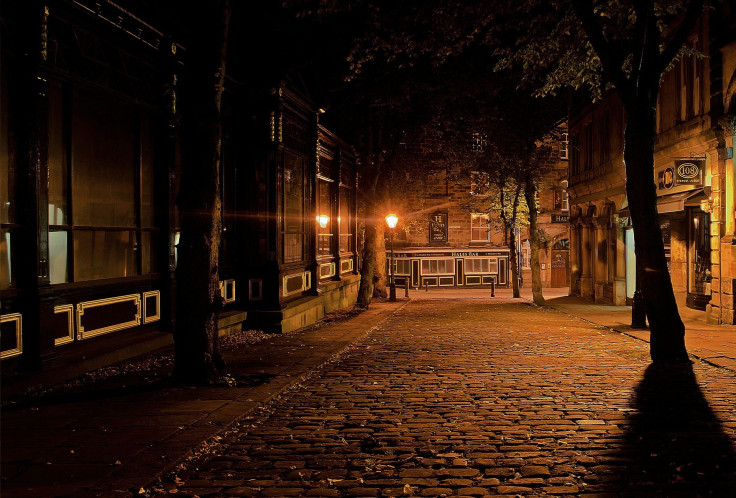Trouble Falling Asleep? Street Light Glow Impacts Sleep Hygiene, May Be Keeping You Awake

Light has a profound impact on how we sleep. Bright sunlight pouring in through the windows in the morning can act as a visual alarm clock, making it nearly impossible to fall back asleep. Staring at a computer screen or smartphone until 2 a.m., meanwhile, can also disrupt your quality of sleep throughout the night — increasing your chances of being sleep deprived and depressed. Now, new research out of Stanford University places the focus on outdoor lighting, like street lights, as a major source of sleep disruption.
The study, which will be presented at the American Academy of Neurology’s 68th Annual Meeting in Vancouver in April, found that outdoor street lights made it harder for people to sleep. This might be a result of our nonstop, fast-paced modern society, in which people stay up later to work, watch Netflix, or communicate via the Internet and smartphones — all ways in which we light up our homes without realizing how it affects our sleep and relaxation. This same mentality is what keeps 24/7 shops open and outdoor areas well lit, in addition to the safety aspects of it.
“Our world has become a 24/7 society,” said Dr. Maurice Ohayon, lead author of the study, in the press release. “We use outdoor lighting, such as street lights, to be more active at night and to increase our safety and security. The concern is that we have reduced our exposure to darkness and it could be affecting our sleep.”
The researchers examined 15,863 people over the course of eight years. Participants answered questions over the phone about their sleep habits, quality of sleep, and any medical or mental health disorders. The researchers then compared this data to information about outdoor lighting in the participants’ neighborhoods, and their surrounding populations — were they in urban areas of 500,000 people or more, or did they live in rural areas or small towns?
It turns out that participants who lived in bigger cities or were exposed to more outdoor light were 6 percent more likely to sleep less than six hours a night, compared to people who lived in the country or in areas where nighttime was truly dark (places where stars aren't hidden by the glow of a city). Twenty-nine percent of people living in cities reported fatigue and dissatisfaction with sleep quality, compared to only 16 percent of people living in areas with less light. And people exposed to a lot of light, on average, slept 10 minutes less a night than people who weren't.
Lowering Light Pollution
Of course, the study doesn’t examine other factors that might go into poor sleep or fatigue — such as air pollution, noise, work schedules, or levels of stress associated with cities or rural areas. And in no way does the study claim that living in low-light areas are better for your health; it didn’t examine access to medical care, suicide rates, likelihood of depression, or any other factors aside from linking lighting to sleep.
If you live in a well lit urban area, you can control your sleep hygiene more than you think. Don’t use a computer or smartphone right before going to bed, as the the blue light suppresses melatonin, a hormone that contributes to making your body go to sleep. Being surrounded by technology emitting blue light can impair the circadian rhythm, research has shown. So even if it takes some discipline, close the laptop, put your phone down, and pick up a book or take a bath before bed to relax you.
Another aspect of sleep hygiene is going to bed at a similar time every night, and waking up after seven to nine hours of sleep. Research has shown that too little and too much sleep are both detrimental to your health, so find your happy medium and stick to that every night. Plenty of studies have shown that long-term sleep deprivation can have a severely negative impact on our bodies, from increasing food cravings and obesity risk to chronic diseases like type 2 diabetes. Lack of sleep has also been shown to have a profound effect on our mental health, increasing impulsivity and distracting thoughts, as well as impairing our self-control and ability to focus.
When it comes to street lights and other city lights pouring in from your dirty urban apartment window, there are some steps you can take to reduce your exposure during the night. Cover your windows with room darkening shades or blinds, or even use eye masks to help improve your sleep quality. These little steps, along with clean sleep hygiene as noted above, will help you feel well-rested every day and better equipped to handle the stresses of city life.
“Light pollution can be found in any sizable city in the world,” Ohayon said. “Yet, excessive exposure to light at night may affect how we function during the day and increase the risks of excessive sleepiness.”
Source: Ohayon M, et al. American Academy of Neurology, 2016.



























